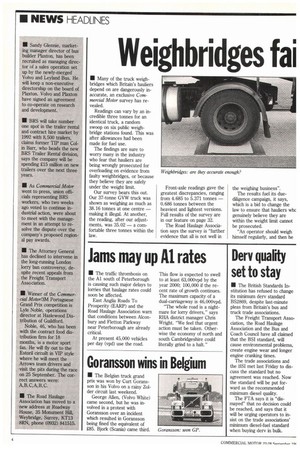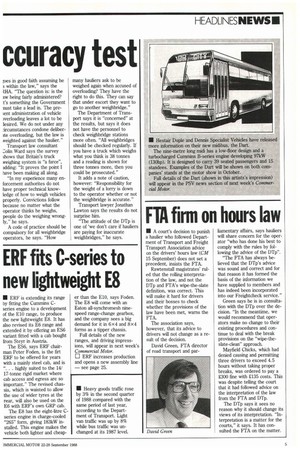Weighbridges fai
Page 4

Page 5

If you've noticed an error in this article please click here to report it so we can fix it.
=racy test
• Many of the truck weighbridges which Britain's hauliers depend on are dangerously inaccurate, an exclusive Commercial Motor survey has revealed.
Readings can vary by an incredible three tonnes for an identical truck, a random swoop on six public weighbridge stations found. This was after allowances had been made for fuel use.
The findings are sure to worry many in the industry who fear that hauliers are being wrongly prosecuted for overloading on evidence from faulty weighbridges, or because they believe they are safely under the weight limit.
Our survey bears this out. Our 37-tonne GVW truck was shown as weighing as much as 38.16 tonnes at one centre — making it illegal. At another, the reading, after our adjustments, was 35.02 — a comfortable three tonnes within the law. Front-axle readings gave the greatest discrepancies, ranging from 4.685 to 5.371 tonnes — 0.686 tonnes between the heaviest and lightest versions. Full results of the survey are in our feature on page 32.
The Road Haulage Association says the survey is "further evidence that all is not well in the weighing business".
The results fuel its duediligence campaign, it says, which is a bid to change the law to ensure that hauliers whc genuinely believe they are within the weight limit cannot be prosecuted.
"An operator should weigh himself regularly, and then he
roes in good faith assuming he s within the law," says the ZHA. "The question is: is the aw being fairly administered? t's something the Government nust take a lead in. The pre;ent administration of vehicle werloading leaves a lot to be iesired. We do not under any :irctunstances condone deliberite overloading, but the law is weighted against the haulier."
Transport law consultant olin Ward says the survey shows that Britain's truck weighing system is "a farce", adding: "It proves the point I have been making all along.
"In my experience many enforcement authorites do not have proper technical knowledge of how to weigh vehicles properly. Convictions follow because no matter what the operator thinks he weighs, people do the weighing wrongly," he says.
A code of practice should be compulsory for all weighbridge operators, he says. "How many hauliers ask to be weighed again when accused of overloading? They have the right to do this. They can say that under escort they want to go to another weighbridge."
The Department of Transport says it is "concerned" at the results, but says it does not have the personnel to check weighbridge stations more often. "All weighbridges should be checked regularly. If you have a truck which weighs what you think is 38 tonnes and a reading is shown for three tonnes more, then you could be prosecuted."
It adds a note of caution, however: "Responsibility for the weight of a lorry is down to the operator whether or not the weighbridge is accurate."
Transport lawyer Jonathan Lawton says the results do not surprise him.
"The attitude of the DTp is one of 'we don't care if hauliers are paying for inaccurate weighbridges," he says.










































































